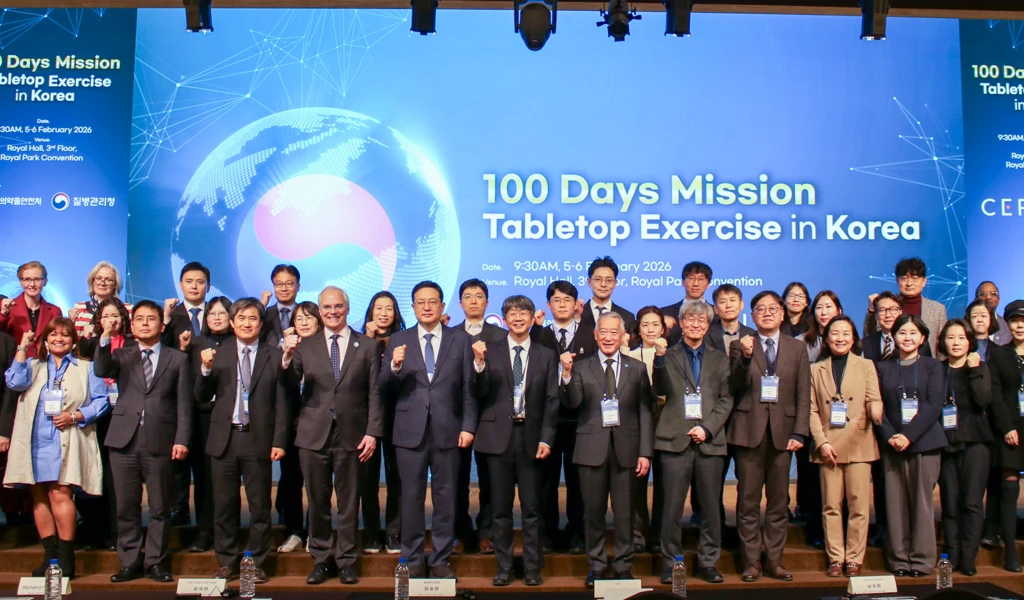NEW YORK/OSLO, Sept 25 - The Coalition for Epidemic Preparedness Innovations today launched a new Biosecurity Strategy aimed at bolstering global health security and underscoring its commitment to tackling emerging epidemic and pandemic threats, whether they arise naturally, accidentally or through deliberate misuse.
The strategy, published during United Nations General Assembly High-level Week 2024 in New York, will harness cutting-edge technologies and foster international collaboration to mitigate the risks posed by emerging pathogens. Its launch is a significant step in CEPI’s evolution, positioning it as a thought leader in the rapidly-developing fields of biosafety and biosecurity.
“Security and equity are at the heart of the 100 Days Mission—a strategy for the world to develop new vaccines against any emerging epidemic threat, regardless of whether it arises naturally, accidentally or due to deliberate misuse, and to do that quickly enough to prevent or mitigate deadly pandemics,” said Jane Halton, Chair of CEPI’s Board.
“To underpin that strategy, and to ensure the world can achieve the 100 Days Mission goal safely and securely, we need a robust, collaborative approach to maximising the benefits of new technologies and reducing their potential threats to human health.”
Biosecurity for a New Era
Central to CEPI’s Biosecurity Strategy is the 100 Days Mission, an ambitious plan spearheaded by CEPI for the world to be able to develop pandemic-busting vaccines within 100 days of identifying a new infectious disease threat. The mission aims to drastically reduce the time required to respond to new and potentially catastrophic outbreaks, regardless of how they arise—potentially averting the loss of millions of lives and trillions of dollars.
The strategy also covers:
- Rapid Vaccine Development: Leveraging advanced technologies, including AI use in antigen design, to accelerate the development of vaccines against threats, whether they arise naturally, accidentally or due to deliberate misuse.
- Biosecurity and Equity: Working to put equity at the heart of approaches to maximise benefits and minimise risks of research.
- Global Collaboration: Working closely with governments, international organisations and the private sector to enable a more coordinated, effective and enduring response to biosecurity threats.
- Risk Mitigation: Taking measures to prevent accidents and the misuse of biological research and technologies. This involves developing and implementing biosafety and biosecurity standards to minimize risks associated with scientific advancements.
Dr. Jean Kaseya, Director General of Africa Centres for Disease Control and Prevention, welcomed the strategy’s launch and said it would also reinforce several key areas of focus of Africa CDC’s Biosafety and Biosecurity Initiative. “With a focus on laboratory systems strengthening, training and infrastructure development, and reducing risks of artificial intelligence and other innovations, the strategy is informed by vulnerabilities across a wide range of resource settings and will help galvanize global progress toward safely and securely achieving the 100 Days Mission,” he said.
As well as embedding its own biosecurity strategy into its operations, CEPI is urging other life science research funders and the wider global health security community to recognise and address the complex challenges posed by emerging biological threats, and to work together to tackle them. The organization is advocating for increased investment in biosafety and biosecurity and the development and wider use of globally-recognised norms and standards to guide the responsible use of biotechnology.
“Effective collaboration between the health and security sectors is essential to build global capabilities to prevent, detect and respond to outbreaks, whether they emerge naturally, due to an accident, or as the result of deliberate misuse,” said Trevor Smith, Deputy Director at Global Affairs Canada and a member of CEPI Biosecurity Strategy Group. “The (CEPI) strategy articulates an ambitious vision for reducing vulnerabilities and strengthening global health security."
The development of CEPI’s new Biosecurity Strategy was supported by funding from Global Affairs Canada.
CEPI’s Biosecurity Strategy can be found here.
CEPI CEO Dr Richard Hatchett discussed the potential role of AI alongside the transforming infectious disease risk landscape and what this means for biosecurity during his speech at the University of Oslo earlier this month, as he accepted an honorary doctorate.



.webp)
